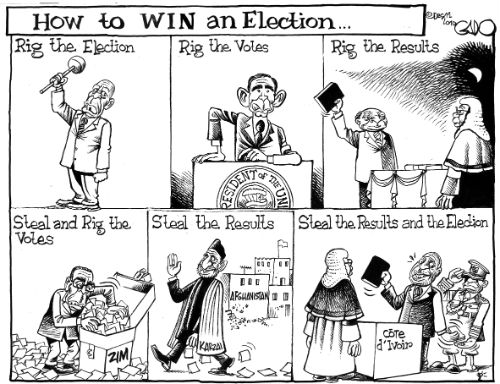The article below, published by IRIN, will hit a nerve in most Zimbabweans. Treated like shit at the polls, like shit at government institutions such as the passport office, like shit at road blocks by surly, bribe seeking policemen and like shit in shops where retailers run establishments that can’t and won’t work out how to give their customers change.
We’ve all been there . . . accepting the most ridiculous items like 3 minute noodles in lieu of what we really want, and what is owed to us, our change in Money. When I’m out shopping I do my level best to make sure that what I’m buying adds up to a round number. When it doesn’t I pay it backwards, giving my change to the next person in the check out queue. I figure this is better than getting a “credit note” that will get lost, or fade before I get home.
Enough is very much enough:
Short-changed and angry
People in Zimbabwe are becoming angry about the lack of small denominations in circulation and tempers are fraying as a result: A policeman recently shot dead a taxi assistant for failing to give him the correct change.
After the formation of a coalition government in February 2008, the hyperinflation-afflicted economy was dollarized – with the US dollar and South African rand most widely used, but the Botswana pula, the Zambian kwacha and the Mozambican metical also in common use.
To avoid disputes, taxis now give out travel vouchers when they run short of change – and the problem is not just in the transport sector.
Sipho Mpofu, a public sector employee, went grocery shopping last week and was given a brown voucher instead of change. “When I asked them what it was for, they told me that they could not provide me with change and the voucher worth five rand would allow me to use their toilets for free. I threw away the offending piece of paper because I knew I was being ripped off.”
The lack of change angers many consumers, who are now trying to make purchases in round numbers. Shops use items such as tomatoes, matches, eggs, potatoes, candles, bananas, sweets, pens, pencils or vouchers in lieu of change.
Mpofu said the use of “unwanted” grocery items was a “huge inconvenience”.
“Right now I have a huge pile of matches, candles and sweets which I have no use for. In fact, they pose a threat should they be set alight accidentally.” He said he had to hide the sweets from his children.
Financial journalist Paul Nyakazeya said consumers were effectively being forced to buy items they did not want.
“At the end of the day, when calculations are made, it may be discovered that the goods consumers end up taking as change… make up a substantial percentage of their monthly groceries… The best way out of this quagmire for the consumers would be the widespread introduction of an electronic system to purchase commodities.”
But, with frequent power cuts, especially in rural areas, Nyakazeya acknowledged it would be very difficult to make such a system work.
Economist David Mupamhadzi told IRIN the authorities urgently needed to introduce smaller currency denominations, especially for the South African rand: Many service providers round up the bill, making goods and services more expensive, eroding disposable incomes and boosting inflation, he said.










